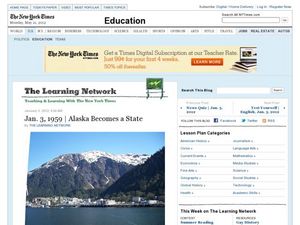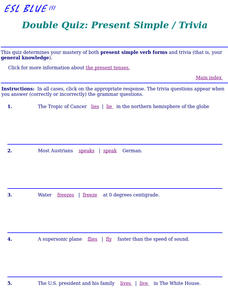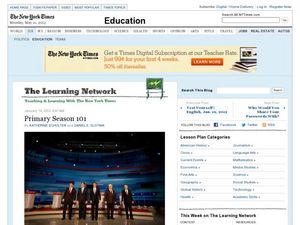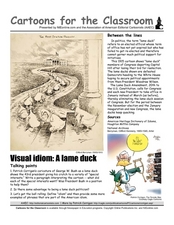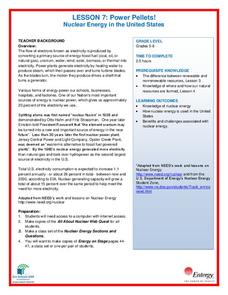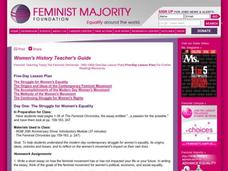ProCon
Penny
Twenty-nine percent of Americans want to abolish the one-cent coin, which begs the question: Is a penny saved really a penny earned? Scholars read fascinating facts about the history of the penny in preparation for a class debate or...
Curated OER
American Becomes a Colonial Power
Exploring the idea of America joining "the imperialist club" at the end of the 19th century, this presentation presents reasons why America not only had the drive to explore the world, but the power and wealth with which to do so....
Curated OER
Cartoons for the Classroom: Fine Tooning a Candidate's Message
In this current events worksheet, students analyze political cartoons featuring John Kerry. Students respond to 4 talking point questions.
Curated OER
Jan. 3, 1959 | Alaska Becomes a State
Make connections with past history and current events with this critical thinking exercise. Kids read background information relating to Alaska's statehood as well as information on oil drilling and Alaska's economy. They put it all...
National Park Service
Same Colors, Different Flavors
Who says getting to know your neighbors has to be difficult? The first resource in a three-part series creates an engaging project that teaches your scholars about Canadian culture. A question-and-answer format takes place via e-mail and...
Curated OER
Double Quiz: Present Simple/Trivia
In this interactive grammar learning exercise, students recognize proper subject/verb agreement. Students complete fifteen sentences by choosing the proper form of the verb given.
Center for Civic Education
To Amend or Not to Amend, That's Been the Question...Many Times
Looking for some ideas for how to celebrate September 17, Constitution Day? Check out a packet that focuses on the factors that are considered in the amendment process. Class members examine the amendment process and the types of...
Curated OER
Primary Season 101
While this New York Times resource posted several months ago it could still be a useful learning experience. Learners practice using the Times's Campaign 2012 Politics section to help them answer 16 questions about the Republican...
Center for Civic Education
What Basic Ideas Are in the Preamble to the Constitution?
Introduce young historians to the US Constitution with this upper-elementary social studies lesson plan. Beginning with a general discussion about the role of government in society, students go on to work in small groups identifying and...
Center for Civic Education
Orb and Effy Learn About Authority
Simplify the teaching of the US Constitution with this primary grade social studies activity. While reading a fun story about an imaginary place called Bubble Land, children learn about the concept of authority and the importance of...
Center for Civic Education
What Is Authority?
Young scholars examine the concepts of power and authority as they begin learning about government in this elementary social studies lesson plan. Through a series of readings, discussions, and problem solving activities, children...
Center for Civic Education
What Basic Ideas About Government Are Included in the Preamble to the Constitution?
Young historians explore the meaning of the Preamble to the US Constitution in this upper-elementary social studies lesson. Working with partners or in small groups, children discuss the purpose of government before reading and analyzing...
Curated OER
What is the Federal System Created by the Constitution?
Explore the unique structure of the federal system of government in the United States. Class members will learn about how most nations were organized before the establishment of the Constitution, how power is currently divided between...
Center for Civic Education
What Does Returning to Fundamental Principles Mean?
Looking for materials for your Constitution Day and Citizenship Day lessons? Then check out this packet of activities that not only gets your class members thinking critically about the fundamental principles at the heart of American...
Curated OER
Geography Application: The Cuban Missile Crisis
A complete activity! The class reads the provided text, then answers the 7 critical-thinking questions. Topics covered are interpreting informational text, reading comprehension, the Cuban Missile Crisis, and US Policy.
Curated OER
Cartoons for The Classroom: Lame Duck Congress
Clear up "lame duck" congressional confusion with this political cartoon analysis worksheet. Background information on the concept's history and current use is provided, and 2 cartoons give a past and present context. Three talking...
Student Handouts
Foreign Affairs
Inform your class about foreign policy during the Reagan administration. The resource includes a reading passage that gives an overview of foreign policy decisions made during the Reagan administration and nine questions for pupils to...
Curated OER
What is Meant by Returning to Fundamental Principles?
What did the Founding Fathers mean by the importance of continually returning to fundamental principles? Your young historians will analyze a series of quotations illustrating the fundamental ideals and principles of the United States...
Curated OER
Jacksonian America and the Indian Removal Act of 1830
Students utilize primary sources to explore the national climate concerning Native American Indians during the Andrew Jackson administration. They are presented with opinions for and against the Indian Removial Act of 1830 as they...
Curated OER
Defined: The Different Types of Government
The world is a big place, so it only stands to reason that different forms of government exist. Democracy, autocracy, oligarch, monarch, and dictatorship are all defined. An extensive explanation of US government system is also included....
National Wildlife Federation
Power Pellets! Nuclear Energy in the United States
Nuclear power provides about 20 percent of the energy generated in the United States. The seventh activity in the series of 12 tackles nuclear power. After sharing what they know about nuclear energy, scholars complete a WebQuest make a...
Curated OER
Comics for the Classroom: Addicted to Spending
Political comics can be a great way to get kids thinking critically about current political topics. They assess this cartoon and analyze how the cartoonist feels about US spending policy. There are three solid critical analysis questions...
Alabama Department of Archives and History
Conflict in Alabama in the 1830s: Native Americans, Settlers, and Government
To better understand the Indian Removal Act of 1830, class members examine primary source documents including letters written by Alabama governors and the Cherokee chiefs. The lesson is part of a unit on the expansion of the United...
Feminist
Women's History Teacher's Guide
The origins, goals, and struggles of the women's movement are the focus of a five-day series of lessons about the accomplishments of the movement and the continuing struggle for women's rights.
Other popular searches
- U.s. Presidents Kindergarten
- 19th Century u.s. Presidents
- U.s. Presidents Contrast
- Projects on u.s. Presidents
- U.s. Presidents Job
- U.s. Presidents Reports
- Presidents of the u.s.
- Esl u.s. Presidents
- U.s. Presidents for Pre K
- U S Presidents Poem
- Ell u.s. Presidents
- Facts About u.s. Presidents





